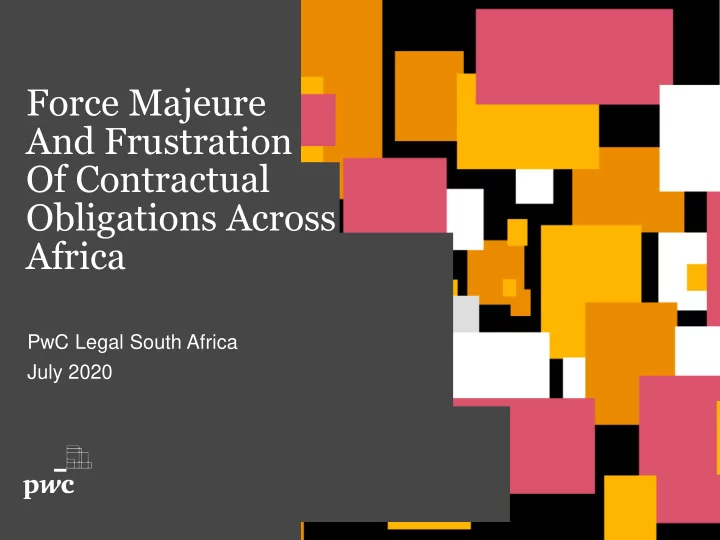

Force Majeure And Frustration Of Contractual Obligations Across Africa PwC Legal South Africa July 2020
Introduction
Introduction • The scope of this presentation covers, at a high level, force majeure and the doctrine of frustration (impossibility of performance) in common law and civil law jurisdictions across Africa. As such, it does not constitute legal advice. • Circumstances of force majeure, also referred to as vis maior or casus fortuitus , may have a variety of contractual implications, including in relation to – • conditions precedent; • material adverse change provisions; • force majeure provisions; and • frustration or impossibility of performance. • Contractual remedies may also be circumscribed by laws promulgated to deal with the circumstances giving rise to force majeure. • The manner in which common law and civil law jurisdictions treat these concepts must be distinguished. In the latter case, it is generally legislated, whilst in the former it has developed through case law. PwC 3
Force Majeure
Force Majeure (1 of 2) Civil Law Jurisdictions in Africa (e.g. Francophone Africa) • Jurisdictions based on French law. • Article 1218 of the French Civil Code – When an event is beyond the control of the debtor, which could have been reasonably foreseen at the time of conclusion of the contract, whose effects cannot be avoided by appropriate measures, and which prevents performance of its obligations. • The elements of force majeure in civil law jurisdictions therefore typically comprise – • the force majeure event must be external; • the force majeure event must be unforeseeable at the time of signature of the contract; and • the force majeure event must be unavoidable. • The French Civil Code also recognizes the concept of “hardship”. • Article 1195 of the French Civil Code, which applies to contracts concluded after 1 Oct 2016, confers the right on contracting parties to renegotiate the contract in the event of a change in circumstances where – • the change was unforeseeable at the time of conclusion of the contract; and • the change renders performance under the contract excessively onerous. • Relief for hardship can be contractually excluded, and the right to renegotiate must be understood in the context of the French law obligation to negotiate in good faith. 5 PwC
Force Majeure (2 of 2) Common law jurisdictions (e.g. Anglophone Africa) • Jurisdictions based on English law, including South Africa. • Factual, contract specific and governing law considerations. • Courts tend to interpret force majeure clauses narrowly. • Issues which are typically subject to negotiation include – • beyond [reasonable] control; • requirement of foreseeability and provision against; • obligation to mitigate effects; and • consequences: notice, and suspension vs right of termination • FIDIC (International Federation of Consulting Engineers) has issued an extensive guidance memorandum on COVID-19 implications for its standard contracts, dealing with, inter alia , environment, health & safety obligations, shortages and change in laws ”. • Risks of incorrectly claiming force majeure include repudiation, cancellation and damages, so force majeure should be invoked with caution. 6 PwC
Frustration/Impossibility of performance
Frustration/Impossibility of performance • This doctrine, if applicable, typically results in the automatic termination of the contract. • Elements that require to be satisfied – • force majeure event must have commenced after conclusion of the contract; and • such event must make it physically or commercially impossible to perform a material obligation or in a manner radically different to that envisaged at the time of conclusion to the contract. 8 PwC
Q&A
Recommend
More recommend